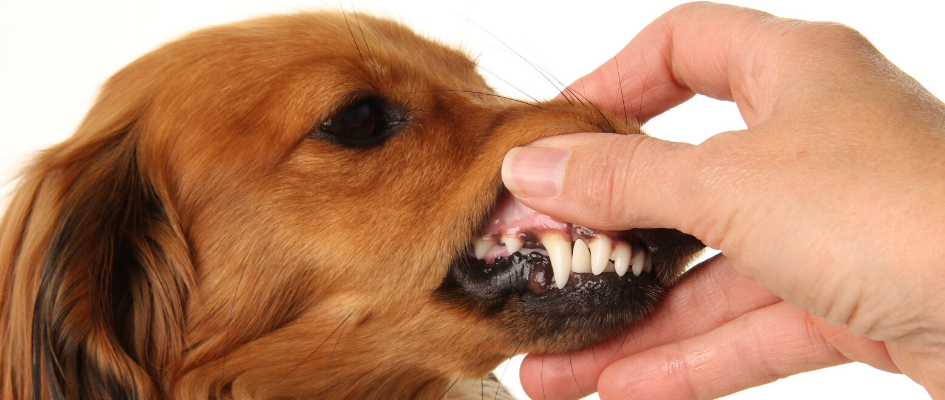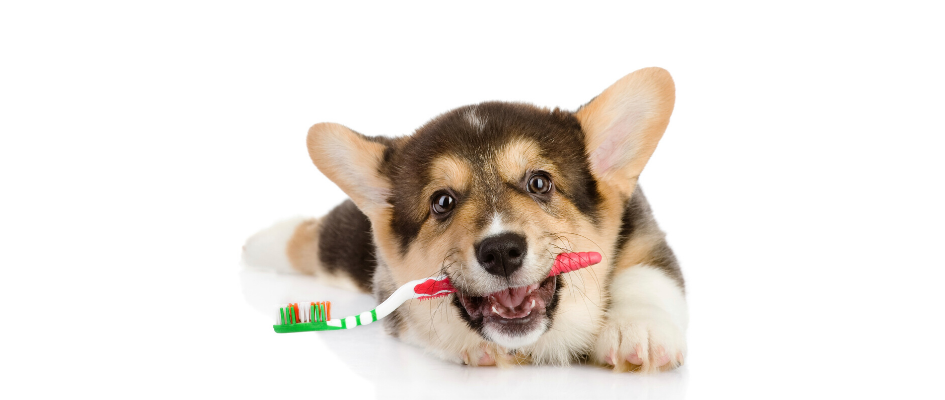Here at Goddard Vet Group, we see a lot of dental problems in both cats and dogs, and in fact dental disease is one of the most commonly diagnosed diseases throughout the UK. But is there any way to prevent this horrible disease? And how can we help your pets?
Dental Diseases in Pets
Dogs can have a variety of dental problems throughout their lives. When they’re young, problems with the deciduous (‘baby’) teeth can mean they’re left with too many teeth in their mouths. This leads to food becoming stuck and causing gum disease. Some dogs are mad chewers – they’ll break teeth or wear them down, which is not only painful but may result in a tooth root abscess. Most commonly, though, dogs suffer from periodontal disease.
Periodontal disease affects dogs of all ages, although it’s more common in older dogs as it takes a while to occur. It’s also more common in some breeds – generally the smaller breeds. Bacteria in the mouth live on the teeth and gums in the form of plaque, and over time they eat away at the gum and get down beneath the gumline. Here, they start to affect the periodontal ligament, which is the connection between the teeth and the jawbone. When this ligament is damaged the teeth become wobbly, which inevitably results in tooth loss.
Cats also get periodontal disease, but they’re also prone to resorptive diseases. This is where the body, for a currently unknown reason, breaks down and re-absorbs the tooth root, resulting in a painful tooth very prone to breaking.

How Can I Prevent Dental Disease at Home?
Whilst resorptive lesions are hard to prevent, some simple changes to lifestyle can make a big difference to the other diseases. Since worn and fractured teeth are a result of dogs chewing on abrasive or hard materials, talk to one of our nurses about appropriate chews that are less likely to cause dental problems. Baby teeth that fail to fall out should be removed under general anaesthetic. They’re often still firmly attached and great care needs to be taken not to damage the root of the nearby adult teeth. This can often be done at neutering or as a separate procedure.
Tooth Brushing
Brushing the teeth is the single most useful thing you can do to prevent periodontal disease. Toothbrushing removes plaque before it has a chance to harden into tartar and cause gum disease. It’s also a great excuse to check your pet’s teeth daily (yes- daily!) for any problems. We always recommend trying to introduce tooth brushing to pets as soon as possible, and to start slow and build up – just like with anything new. Don’t forget, never use human toothpaste (it’s not good for our pets!). Our nurses are fantastic at giving you top tips for tooth brushing, so if you think you can make time in your day to brush your pet’s teeth, please give them a call or book in for a free dental check to go over it.
Dental Dog Chews
Some dental chews have been shown to reduce the level of plaque in the mouth. However, there are a lot of brands out there that may not have the same benefits. We recommend choosing from the Veterinary Oral Health Council’s list of approved products, or talking to our nurses. Don’t forget that these chews contain extra calories which should be accounted for in your pet’s daily allowance to avoid obesity.
Can Water and Food Additives Help?
Water and food additives to prevent plaque build-up do exist and some even have evidence that they help. Whilst they’re not going to be as good as tooth brushing, they’re a good added extra, especially in pets that won’t allow anything else. Again, the VOHC have a list of accepted products, so choose from this list or discuss with one of our nurses at your next dental check.
Diets for Dental Disease
For those animals very prone to dental disease, specific diets have been created to reduce plaque and tartar through a combination of ingredient choice and kibble that breaks up in a particular way. These diets are prescription diets, so if you think you’d like to try them please have a chat with our team.

How Can my Vet Help?
Despite doing some, or all, of these things at home, it’s still possible that your pet will suffer from periodontal disease. This is especially true if your pet is genetically predisposed or has already lost teeth to the disease.
Regular check-ups with your veterinary nurse can keep track of the level of plaque and tartar in your pet’s mouth and allow an early-warning sign if disease is starting. However, our animals are masters at hiding the signs of disease and sometimes a dental check-up under general anaesthetic is necessary to allow us to do a more thorough exam.
Problems such as fractured teeth, exposed pulp, wobbly back teeth and resorptive lesions can be missed on a conscious check-up, especially if your pet objects to the examination. Putting them under a general anaesthetic allows us to examine more thoroughly and even test the teeth for problems using a dental probe, just like a human dentist. And during the check-up, just like at the dentists, they’ll also get a scale and polish. This enables us to remove any tartar build up from the hard to reach places before it starts to cause a major problem.
For most pets, a scale and polish are necessary every 6-12 months. After all, we humans brush twice daily, but we still miss spots and need a professional clean at least annually. Whilst it is theoretically possible to clean the teeth conscious, the most important area to clean is under the gum line. This is uncomfortable for pets and the majority will not tolerate it without an anaesthetic, meaning that cleaning without anaesthetic results in a sub-standard clean.
When was the last time your pet had a dental clean? If they’re overdue, why not book for a check-up with our vet team and we’ll talk it all through with you!
